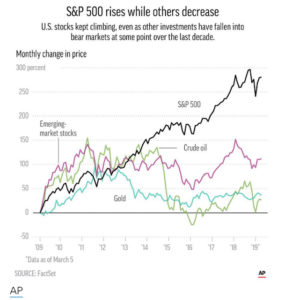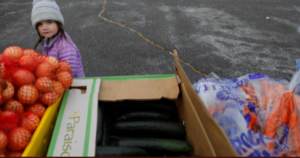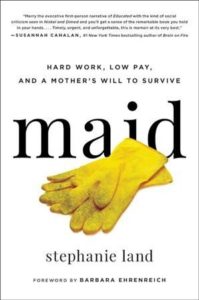Middle class
The Middles Class Declines…Again
March 10, 2019But the billionaires and millionaires…their profits…continue to rise.
AP/AXIOS/NYTimes
More than $30 trillion: That’s the amount of wealth generated by stocks’ 10-year bull run, per the N.Y. Times’ Matt Phillips.
- “Adjusted for inflation, that is the most created during any bull run on record, edging out the $25 trillion in gains during the epic streak from December 1987 to March 2000, which ended with the bursting of the dot-com bubble.”
The fruits went mostly to the rich, per The Times:
- The net worth of the wealthiest 10% of American families grew by double-digit %s.
- Median American family wealth dropped 34%.
Why it matters: “In the past, such episodes of wealth destruction cast long shadows. For much of the 20th century, the financial habits of the American public were heavily influenced by memories of the Great Depression.”
Poverty is real and persuasive.
January 29, 2019CBS
Aimee Picchi
40% of Americans only one missed paycheck away from poverty.
“This is not a problem of just low-income people — this is a problem of middle-class people and even people with higher income without enough savings,” Wiedrich said. “If they hit a shock, they are in the same boat. Maybe they can’t pay their mortgage” or must make choices about what bills to pay.
Another financial challenge that keeps many people the edge is housing. Homes are becoming less affordable across the country, with median home values now early four times higher than median incomes — experts generally advise against spending more than three times income on housing. Similarly, half of all renters say they spend more than a third of their income on rent and utilities.
Millions of middle-class Americans are just one missed paychecks away from poverty, with 4 of 10 considered “liquid-asset poor,” or without enough money socked away to cope with even a sudden disruption in income.
Despite the lowest unemployment rate in decades and solid economic growth, many Americans are on thin financial ice, Prosperity Now found. Minority households are particularly lagging on key measures such as income and wealth, the study found. Across the board, more than 1 in 10 American households fell behind in their bills in the last year, a signal that many are struggling with rising costs and stagnant incomes.
https://www.cbsnews.com/news/40-of-americans-one-step-from-poverty-if-they-miss-a-paycheck/
Souther Poverty Law Center/Press-Citizen.com
“Almost 1,400 people drove with suspended/revoked licenses from 2016-2019 in Iowa, 1 of 40+ states that suspends licenses for nonpayment of fees & fines. If people can’t drop their kids off at school or drive to work, how are they supposed to pay the bills?
License suspensions have a greater impact on low-income families.
Unpaid traffic tickets can be used as a reason to suspend someone’s license in more than 40 states, including Iowa (and 40 other states). Court debt includes all unpaid fines, penalties, court costs, fees, criminal surcharges, victim restitution, court-appointed attorney fees, among other items.”
NPR/Fresh Air
Terry Gross
“While raising her young daughter as a single mother, Stephanie Land cleaned houses through an agency to scrape by. It was back-aching work and the pay — $8.55 an hour to start, $9.25 an hour two years in — just wasn’t enough.
Land, who had left an abusive relationship, lived for a time in a homeless shelter with her daughter. She supplemented her housecleaning income with government assistance, at one point accruing seven types of aid simultaneously, including housing and utility assistance, food stamps, child care grants and Medicaid.
Looking back, she says, “There’s no way that you can work full time [at] minimum wage and have a family. It’s impossible.”
Reclaiming Idaho
August 1, 2017The 1977 Medicaid Mobile/Camper made it to Hailey Monday night, July 31st, to meet area residents who want to reclaim Idaho’s middle class with equal accessibility to public education, public lands, and medical care. Co-founder Luke Mayville spoke to me about reaching beyond politics and party to focus on message, moderation, and the middle class.
MESSAGE
MODERATE VOICE
RECLAIM MIDDLE CLASS
RECLAIM IDAHO GRASSROOTS GOAL
- strengthening public schools
- protect public lands and natural resources
- extend healthcare to working families
- 50 neighborhood teams by the end of August
Neighborhood discussions to reclaim Idaho’s middle class
Spiritual Crisis of the Modern Economy
January 2, 2017The Atlantic
Victor Tan Chen
The main source of meaning in American life is a meritocratic competition that makes those who struggle feel inferior.
What is happening to America’s white working class?
The group’s important, and perhaps decisive, role in this year’s presidential election sparked a slew of commentary focused on, on the one hand, its nativism, racism, and sexism, and, on the other, its various economic woes. While there are no simple explanations for the desperation and anger visible in many predominantly white working-class communities, perhaps the most astute and original diagnosis came from the rabbi and activist Michael Lerner, who, in assessing Donald Trump’s victory, looked from a broader vantage point than most. Underneath the populist ire, he wrote, was a suffering “rooted in the hidden injuries of class and in the spiritual crisis that the global competitive marketplace generates.”
That cuts right to it. The modern economy privileges the well-educated and highly-skilled, while giving them an excuse to denigrate the people at the bottom (both white and nonwhite) as lazy, untalented, uneducated, and unsophisticated. In a society focused on meritocratic, materialistic success, many well-off Americans from across the political spectrum scorn the white working class in particular for holding onto religious superstitions and politically incorrect views, and pity them for working lousy jobs at dollar stores and fast-food restaurants that the better-off rarely set foot in. And when other sources of meaning are hard to come by, those who struggle in the modern economy can lose their sense of self-worth.
Full story:
https://www.theatlantic.com/business/archive/2016/12/spiritual-crisis-modern-economy/511067/





